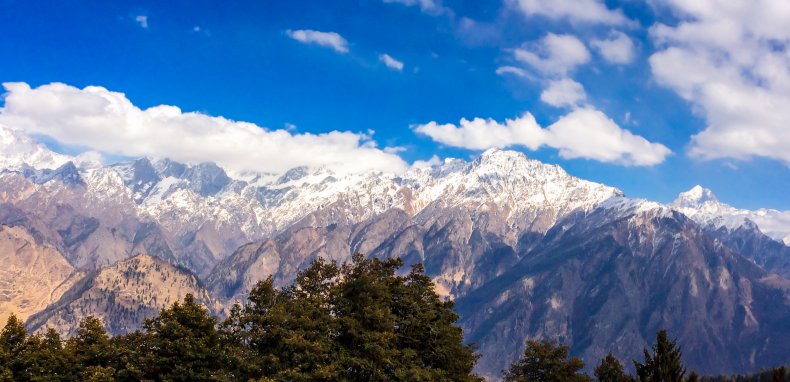Some residents in the Indian state of Punjab are reporting that parts of the Himalayas are now visible from their area amid the country’s coronavirus lockdown, the first time in decades that this has been possible.
Many areas of the country have experienced a large drop in air pollution, like other parts of the world, since the world’s largest lockdown, impacting 1.3 billion people, came into force toward the end of March
In fact, a report published by India’s Central Pollution Control Board revealed that air quality in 85 cities across the nation had improved significantly since the beginning of the lockdown, with the roads largely empty of vehicles and non-essential businesses shut down.
“Data shows that on average, Indian cities had an AQI [Air Quality Index] of 115 between March 16 and 24,” the report read. “The air quality started showing improvements from the first day of the 21-day lockdown. The average AQI fell to 75 in the first three days of the lockdown.”
The drop in air pollution is notable in the country home to 21 of the world’s 30 most polluted cities, according to the IQAir AirVisual’s 2019 World Air Quality Report. One result of this reduction in air pollution is that blue skies are returning to areas where the air is usually muddied by pollution.
Never seen Dhauladar range from my home rooftop in Jalandhar..never could imagine that’s possible..clear indication of the impact the pollution has done by us to Mother Earth ðŸŒ.. this is the view pic.twitter.com/laRzP8QsZ9
— Harbhajan Turbanator (@harbhajan_singh) April 3, 2020
“I have not seen such blue skies in Delhi for the past 10 years,” Jyoti Pande Lavakare, co-founder of Indian environmental organization Care for Air, told CNN. “It is a silver lining in terms of this awful crisis that we can step outside and breathe.”
This effect is also particularly apparent in Punjab, which lies in the country’s north, where most of the cities are now in the “green zone” according to the Central Pollution Control Board, Indian outlet The Print reported.
Amid these falls in air pollution, residents of the city of Jalandhar in Punjab have been posting images on social media showing the snow-capped peaks of the the Dhauladhar mountain range, part of the wider Himalayas, which lie farther to the north in the state of Himachal Pradesh, more than 100 miles away. Some locals even claimed that it was the first time they had seen these peaks from this area.
“Never seen Dhauladar range from my home rooftop in Jalandhar..never could imagine that’s possible..clear indication of the impact the pollution has done by us to Mother Earth .. this is the view,” one Twitter user @harbhajan_singh posted.
The Himalayas are a mountain range in Asia that contains many of the world’s highest peaks, including Mount Everest.
Centers for Disease Control and Prevention Advice on Using Face Coverings to Slow Spread of COVID-19
- CDC recommends wearing a cloth face covering in public where social distancing measures are difficult to maintain.
- A simple cloth face covering can help slow the spread of the virus by those infected and by those who do not exhibit symptoms.
- Cloth face coverings can be fashioned from household items. Guides are offered by the CDC. (https://www.cdc.gov/coronavirus/2019-ncov/prevent-getting-sick/diy-cloth-face-coverings.html)
- Cloth face coverings should be washed regularly. A washing machine will suffice.
- Practice safe removal of face coverings by not touching eyes, nose, and mouth, and wash hands immediately after removing the covering.
World Health Organization advice for avoiding spread of coronavirus disease (COVID-19)
Hygiene advice
- Clean hands frequently with soap and water, or alcohol-based hand rub.
- Wash hands after coughing or sneezing; when caring for the sick; before, during and after food preparation; before eating; after using the toilet; when hands are visibly dirty; and after handling animals or waste.
- Maintain at least 1 meter (3 feet) distance from anyone who is coughing or sneezing.
- Avoid touching your hands, nose and mouth. Do not spit in public.
- Cover your mouth and nose with a tissue or bent elbow when coughing or sneezing. Discard the tissue immediately and clean your hands.
Medical advice
- Avoid close contact with others if you have any symptoms.
- Stay at home if you feel unwell, even with mild symptoms such as headache and runny nose, to avoid potential spread of the disease to medical facilities and other people.
- If you develop serious symptoms (fever, cough, difficulty breathing) seek medical care early and contact local health authorities in advance.
- Note any recent contact with others and travel details to provide to authorities who can trace and prevent spread of the disease.
- Stay up to date on COVID-19 developments issued by health authorities and follow their guidance.
Mask and glove usage
- Healthy individuals only need to wear a mask if taking care of a sick person.
- Wear a mask if you are coughing or sneezing.
- Masks are effective when used in combination with frequent hand cleaning.
- Do not touch the mask while wearing it. Clean hands if you touch the mask.
- Learn how to properly put on, remove and dispose of masks. Clean hands after disposing of the mask.
- Do not reuse single-use masks.
- Regularly washing bare hands is more effective against catching COVID-19 than wearing rubber gloves.
- The COVID-19 virus can still be picked up on rubber gloves and transmitted by touching your face.



















